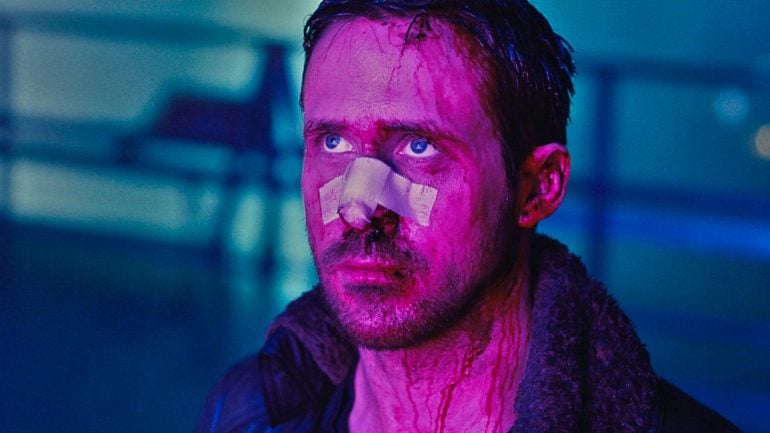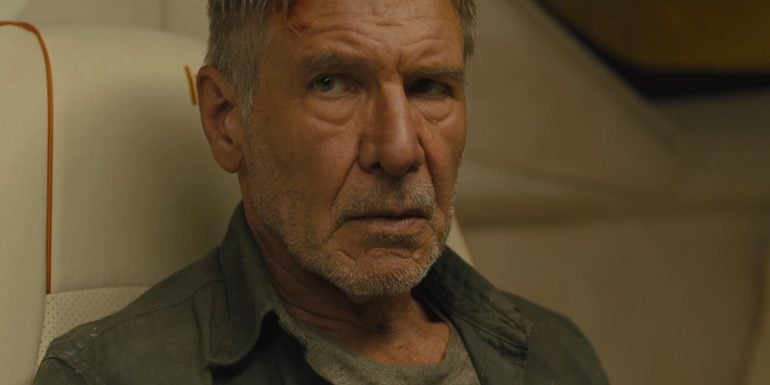I admit it. I’m the person responsible for making Blade Runner 2049 bomb at the box office. Before you judge me, let me say in my defence that it’s possible that you may have made that happen, too. I’m a fan of Ridley Scott’s 1982 film Blade Runner – in fact, it’s one of my favourite films of all time. Over the years, I’ve owned several copies of it on video and DVD, from original release versions all the way down to all of the subsequent Director’s Cuts and Final Cuts. Yet, for all my love of it, I didn’t see Blade Runner 2049 at the cinema, even though I wanted to. I ooh-ed and aah-ed over the trailers for it and enthusiastically raved over the short films that came out before the film’s release.
But, like many out there – and you may be one of them – I still haven’t made the journey to watch it at the cinema. For that, I owe the cast and crew of that film an apology. It’s possible that you may not have watched it at the cinema either, or if you did, then it’s possible you may have only seen it there once or possibly twice. Certainly, whatever any of us did (or didn’t do), it wasn’t enough to make the film a commercial hit. But here’s the thing: I don’t feel all that guilty about missing it on the big screen, even though I’ve now seen the film and can genuinely say that I loved it.
The Anticipation for Blade Runner 2049

When Denis Villeneuve’s Blade Runner 2049 was first announced to the world, it was initially met with cheers from fans… and also some trepidation. No fan wanted to see a sub-par sequel to Blade Runner, one of the finest science fiction movies ever made. As new details emerged and trailers were revealed, it looked increasingly likely that Villeneuve would achieve the impossible: create a worthy sequel. It was obvious that fans were becoming excited to see it and some industry insiders even started to believe that, unlike Ridley Scott’s original film, it could become a box-office blockbuster.
The film came out and received mostly overwhelming praise from both critics and Blade Runner fans… but subsequently underperformed at the box office. Despite all the positive reviews and despite it making a modest amount of cash, it was no blockbuster. It was a bomb. Yet in a strange way, I don’t think that was a bad thing. In fact, to me, it’s arguably made it more special.
Hollywood’s Focus on Commercial Success

Obviously, the filmmakers weren’t hoping for the film to be a box-office failure. Nobody in their right mind would. Studios put out hundreds of films each year, with the ultimate goal at the end of the day for each of them being that they all be profitable. Sadly, the underperformance of Blade Runner 2049 reinforces Hollywood’s continuing general belief that audiences want nothing more than superheroes, Star Wars, and sequels to Fast & The Furious and Transformers. It’s a blow for intelligent science fiction films in general and a poor reflection on the movie itself. The commercial aspect of cinema demands results, and Blade Runner 2049 simply failed to deliver. Then again, so did the original film… and who cares about that these days?
In an era of Porky’s, Rocky III and Rambo, 1982’s Blade Runner was equally unprofitable initially, and has never been a cash cow even after it achieved the cultural recognition it has today. It took time to find its audience and to be accepted as the work of art that it is. While instantly dismissed as too cerebral and too boring, it’s now widely recognised as a groundbreaking masterpiece. Like many other films, from Citizen Kane and The Wizard of Oz to Fight Club and The Shawshank Redemption, Blade Runner tanked in terms of revenue but later achieved legendary status. The true quality of it shone through.
The Value of Art Beyond Box Office Numbers
Making money may be the way in which success is gauged by Hollywood, on box office countdown TV shows and in entertainment headlines. However, the box office is never a statement of artistic quality. Director Gus Van Sant once criticised the nature of films being primarily judged by their earnings and that comparing those numbers is akin to comparing statistics on baseball cards – they’re never a full and true reflection of the real worth of the subject in question. The value of art can’t – and shouldn’t – be measured solely by box office figures. There are countless bad movies, box office hits, and many good films which aren’t.
The real achievements of Blade Runner 2049 can’t be defined by the usual crass standards of commercialism but rather by the product itself. The story is intriguing, the acting is solid, and the score, effects and directing are all of the highest calibre. It’s a work of art, as it should have been, and equally important is that it’s a sequel which honours what came before. Blade Runner 2049 manages to recapture the tone and look perfectly while still being creatively original in its own right. It’s a slow-burn mood piece which goes against the grain, eschewing whiz-bang explosions and embracing bold, intelligent science fiction.
It isn’t perfect by any means, and some criticism is justified. The film may be too long for some (a complaint which even Ridley Scott has agreed with) and too pretentious, cerebral or boring for others. But then, to have made it any differently would also have been an insult to Blade Runner and its many fans. Too often, poor sequels (and prequels) have retroactively tarnished the originals – such as in the case of The Matrix or Star Wars. This film doesn’t do that. It honours Blade Runner in a way that many thought was impossible. As a movie, it’s a success in all ways except financially. While Denis Villeneuve may have been understandably disappointed with the box office returns, he should take some solace from the positive reaction to his work from both critics and fans.
The Symmetry of Two Films

There’s a strange symmetry at play here. Both films are exceptional pieces of filmmaking; both were released to an audience that wasn’t ready to accept it, and both films have been commercially disappointing. But the original Blade Runner proved that all that was needed for it to gain legendary status was to wait for the film to find its audience, and Blade Runner 2049 looks set to achieve that, too. Those who care about the numbers and the money made can be happy that since its DVD and Blu-ray release, it’s been topping the sales charts. Personally, I don’t care about sales or money. What I care about is what that news really means:
It means that it’s being watched, and hopefully appreciated, by viewers who probably missed it in general cinema release just like me. And like the original, in time it’ll most likely be treasured in much the same way. It may not be the Hollywood definition of success, but to fans, it’s the quality that really counts.
RELATED: Blade Runner 2049 Explained








